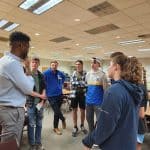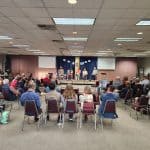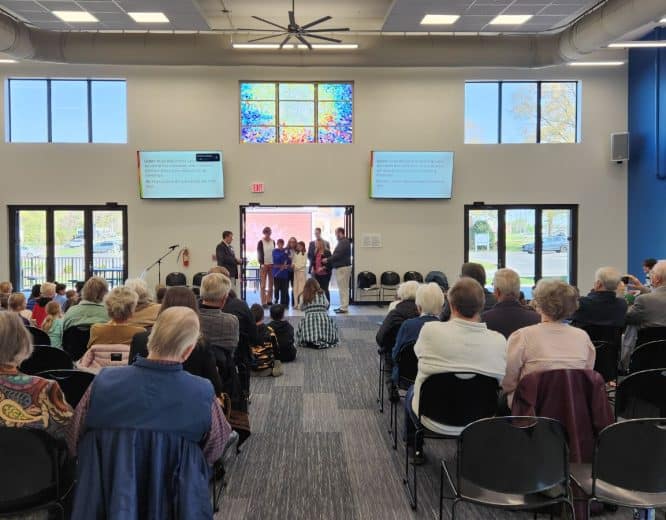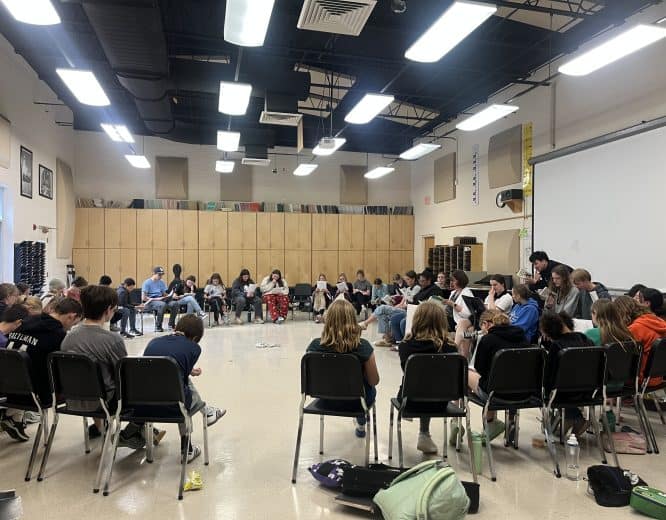Exploring the power of peace
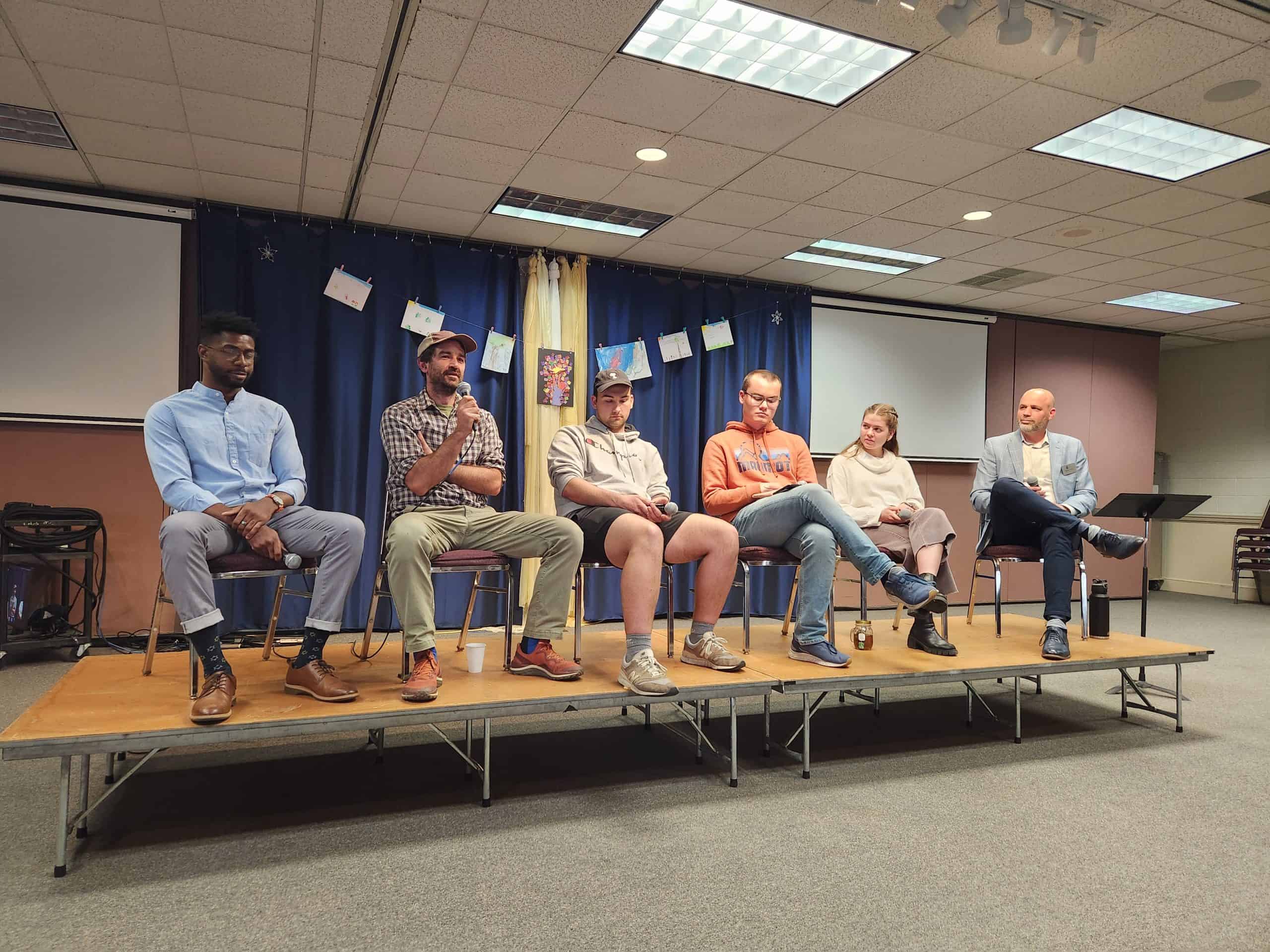
Conscientious objection embodies the principled refusal to engage in certain activities or fulfill specific obligations on moral or ethical grounds. It is often associated with refusing to participate in military service or warfare due to deeply held beliefs against violence or killing. On the evening of Monday, April 22, Eastern Mennonite School (EMS) hosted an event funded by the Kennel-Charles Endowment, founded by Elmer and Marianne Kennel, for EMS events that stimulate an interest in Anabaptist history among young people. At the event, five young peacemakers shared their stories of why they chose peace over military service. EMS teacher Ben Bixler set the tone by highlighting the ongoing relevance of conscientious objection in today’s world. This is their story.
Young peacemakers
Ami’s journey to peace started with one question when he served in the military: why do we kill people? “If you kill someone or make any kind of escalation then they’re just going to fight you back. …you can really only say, we probably should try this peace thing out.” When he decided he did not want to contribute to violence anymore, he went to the Center on Conscience & War to get conscientious objector (CO) status.
Ami joined about 85 youth and adults in the Eastern Mennonite School (EMS) dining hall as one of the panelists. He shared why he made the drive from his home in DC for this event. “I’m Jewish. Tonight is the night of Passover, which is the most holy day in Judaism. I decided to be here tonight instead of with my family because I feel like people should [gain] understanding about peace from many different sides.”
Sara Kennel is a current student at Eastern Mennonite University (EMU). Her background included both the Mennonite faith tradition and a family involved in the military. “I see nonviolent strategy as the most sustainable option for reconciliation. Some people more easily justify violent intervention as the best way to stop harm from happening to the greatest number of people. I often find myself in the messy middle of those two conversations.”
Aidan Yoder and Adam Stoltzfus, also students at EMU, shared a Mennonite background and a similar approach to peace. They are both registered for selective service and created a conscientious objector file with writings to verify their peace position. Like others on the panel, faith-informed Adam’s decisions. “My Mennonite beliefs and values call me to resist war and promote peace. I grew up in a Mennonite household and church. It was there that I learned what it means to follow Jesus and what it means to be a peace builder. I also attended Eastern Mennonite School where peacebuilding is an integral part of the curriculum from K to 12.”
Aidan Yoder’s grandparents grew up in the pacifist Mennonite tradition, joining voluntary services instead of the military. Aidan continues this tradition in his own way. He encouraged young people to get involved through peaceful protest or other forms of resistance to violence. “I get an active choice to decide if I’m going to be a bystander or stand up in the face of something happening that’s not okay. And saying something about it…so that it changes and doesn’t continue a cycle of harm.”
Choosing Peace
In some states, like Virginia, you can’t get your driver’s license until you’ve registered for selective service or turned 26. Tim Showalter opted not to register, jokingly saying, “I rode my bike for a lot of years!” This decision also made him ineligible for federal and state aid for college, but he stands by it, “I like thinking through history about the nonviolent movements that have succeeded. They give… hope for what could be. When I think about who I want to be in the world based on my Christian faith, on who I understand Jesus to be…I wanna be a part of those movements.”
One high school senior noted, “it’s interesting to consider the ethical side of war and the contributions of different businesses to the military.” His classmate reflected how his job after graduation will be with a military contractor – and he felt they were not contributing to the fighting, but focused on saving lives.
For students getting learner’s permits, the discussion sparked interest in information on conscientious objection (CO) status. Some were uncertain at the DMV when faced with selective service checkboxes, but found guidance on the steps to achieve CO status helpful. A few students expressed a newfound commitment to seeking peacemaking strategies, feeling inspired by the conversation. They also noted the lack of information and alternative perspectives when military recruiters visit public schools, appreciating the opportunity to learn about other options (easternmennonite.org has a list of CO resources).
Georgia Metz, pastor at Shalom Mennonite of Harrisonburg, introduced the initial idea for the event. She reflected on the evening. “I am constantly inspired by the legacy of nonviolence and conscientious objection in the Anabaptist tradition. As a believer in the redeeming work of Jesus, I have taken on that pacifism as an important part of my own discipleship and faith practice. My hope is to inspire youth and young adults to continue in that long tradition.”
This article can also be read on Anabaptist World

